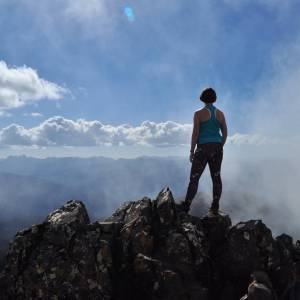Gemischt & mixed
It is easy to forget the privilege of being a native English speaker. Too few of us learn other languages, but when we do try some linguistic gymnastics, we do so knowing that if all else fails, English is there to catch us. After all, in many of the popular places for travel, it seems that most people have at least a smattering of English. But once you force yourself to stick to your unfluent language, you realise there is a second layer of privilege in speaking any native language - a superfluity of abundance in vocabulary and grammatical acrobatics. Every sentence can be said a thousand ways, flippant comments can be thrown back and forth, a world of expressive opportunities lies before you.
One of my main goals on this trip is to refresh my German. It's been too long since my language skills have been pushed, and they have suffered for it. But I forgot how exhausting it is to live in a second, unpractised language. I find myself preparing the one question I need to ask of the tour guide or shop attendant, running over it in my head as I iron out the grammatical errors. As I approach to ask, I consider asking in English to save the embarrassment of getting a noun's gender wrong, or forgetting to pronounce an umlaut. But ultimately, for me, it is more embarrassing not to try.
In Frankfurt, and other large cities, people will roll their eyes and switch to English as soon as you pronounce something a bit too Englishy (although my accent tends to confuse people, having only ever learnt from native speakers and immersion - Dutch, Belgian or Swiss are the usual guesses). But in smaller towns, people are more patient, and perhaps less keen on dusting off their rusty English. They are willing to wait, to rephrase, to speak slower, and to work with you.
It's the off-season, and so in smaller towns like Würzburg, many of the tourist businesses are in hibernation. I joined a short tour of Festung Marienberg, as it was the only way to see a few tunnels and towers. As the only option was in German I took it as a challenge. I understood most of it (except the bit when I vagued out for a while). As a tour guide, I appreciate it when people come and thank me for speaking clearly, so at the end of the tour, I passed on that favour and thanked my guide. Had she known, she exclaimed, she would have spoken slower or more clearly. But perhaps that is why I didn't mention it - a few days into my trip and this was a test to set an early benchmark.
Earlier in the day, I almost came to an impasse with a museum attendant who was bored and keen to chat with guests. He wanted to practise his English, and I wanted to practise my German. For him, English is a hobby, having only learned Russian during his East German schooling. We settled on that familiar mixed dialect that switches haphazardly, repeating a word or sentence in both languages until everyone understands. In the evening, on retreat to a cafe for some warming cake and tea, I confused the server by asking what a 'Kännchen Tee" was. I assumed it probably meant a pot, but wanted to be sure. "It's a Kännchen...of tea..." she exclaimed (in German). "But what is a Kännchen???" I asked, resisting the urge to ask in English. "It's... it's... it's a Kännchen...!" She was obviously exasperated by my foolish lack of understanding and retrieved one from the cupboard to wave at me. I apologised for my ignorance, and ordered the Kännchen, despite it's being well overpriced.
I often think about the comment a Dutchman made to me about people trying to speak Dutch - "it is so inefficient, when we can both speak English perfectly well."
Yes, it is inefficient, but isn't it also just a bit fun?

Comments
Sign in or get an account to comment.


